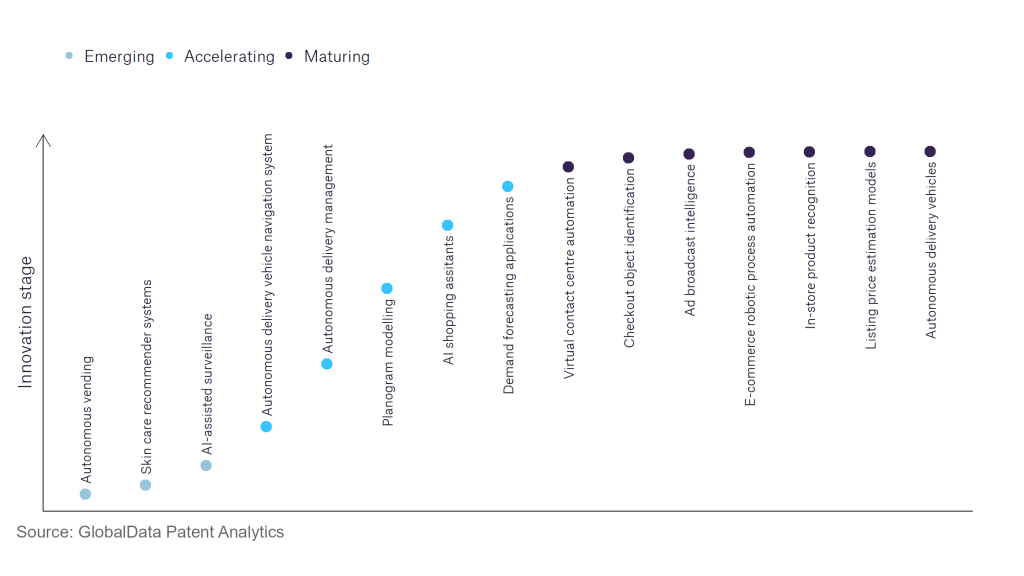The retail industry continues to be a hotbed of innovation, with activity driven by technology, supply chain optimisation, and risk mitigation and the growing importance of technologies such as robotic inventory management and autonomous delivery robots, and store assistants. In the last three years alone, there have been over 133,000 patents filed and granted in the retail industry, according to GlobalData’s report on Artificial Intelligence: AI shopping assistants. Buy the report here.
However, not all innovations are equal and nor do they follow a constant upward trend. Instead, their evolution takes the form of an S-shaped curve that reflects their typical lifecycle from early emergence to accelerating adoption, before finally stabilising and reaching maturity.
Identifying where a particular innovation is on this journey, especially those that are in the emerging and accelerating stages, is essential for understanding their current level of adoption and the likely future trajectory and impact they will have.
70+ innovations will shape the retail industry
According to GlobalData’s Technology Foresights, which plots the S-curve for the retail industry using innovation intensity models built on over 128,000 patents, there are 70+ innovation areas that will shape the future of the industry.
Within the emerging innovation stage, autonomous vending, skin care recommender systems, and AI-assisted surveillance are disruptive technologies that are in the early stages of application and should be tracked closely. Autonomous delivery vehicle navigation system, autonomous delivery management, and planogram modelling are some of the accelerating innovation areas, where adoption has been steadily increasing. Among maturing innovation areas are virtual contact centre automation and checkout object identification, which are now well established in the industry.
Innovation S-curve for artificial intelligence in the retail industry

AI shopping assistant is a key innovation area in artificial intelligence
AI shopping assistants are online tools designed to help consumers find products they are shopping for. These virtual shopping assistants provide answers to consumers’ questions and help them in navigating through the online retail store. Some of these assistants can even place orders for consumers. Virtual shopping assistants are made in different types and shapes.
GlobalData’s analysis also uncovers the companies at the forefront of each innovation area and assesses the potential reach and impact of their patenting activity across different applications and geographies. According to GlobalData, there are 50+ companies, spanning technology vendors, established retail companies, and up-and-coming start-ups engaged in the development and application of AI shopping assistants.
Key players in AI shopping assistants – a disruptive innovation in the retail industry
‘Application diversity’ measures the number of different applications identified for each relevant patent and broadly splits companies into either ‘niche’ or ‘diversified’ innovators.
‘Geographic reach’ refers to the number of different countries each relevant patent is registered in and reflects the breadth of geographic application intended, ranging from ‘global’ to ‘local’.
Patent volumes related to AI shopping assistants
Source: GlobalData Patent Analytics
The leading companies in the AI shopping assistants space in terms of patents filed are SoftBank Group, Nant, Walmart, and Magic Leap. Walmart launched a new tool on its app and website called Choose My Model, which is supported by artificial intelligence and computer vision to help customers virtually try clothes before purchasing them. The tool allows customers to choose a person who matches their shape, height, and skin tone.
The leading companies in this space in terms of application diversity are Healthy io, Walmart, Stryker, and Standard Cognition.
The major companies in terms of geographic reach are Elanco Animal Health, MTG, Specsavers Optical Group, and Intsig Information.
As a result of the pandemic, consumers have been shopping online more often, reluctant to shop in physical stores. However, consumers miss trying their clothes and footwear before purchasing them while shopping online. To address this issue, AI shopping assistants will be adopted by more retailers in the future.
To further understand the key themes and technologies disrupting the retail industry, access GlobalData’s latest thematic research report on Artificial Intelligence in Retail.
Data Insights
From

The gold standard of business intelligence.
Blending expert knowledge with cutting-edge technology, GlobalData’s unrivalled proprietary data will enable you to decode what’s happening in your market. You can make better informed decisions and gain a future-proof advantage over your competitors.



